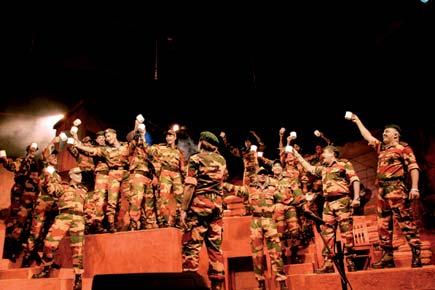Gujarati theatre may not be known for experimentation, but Code Mantra shows how it can be done

 It is always heartening to see a production that bucks current trends and manages to get audience appreciation too. Commercial Gujarati theatre is not known for experimentation, or for even straying too far from accepted norms. Producers depend on box office sales for their revenue and some ‘sold-out’ shows (selected by community groups for their members), so they normally pick safe, crowd-pleasing subjects.
It is always heartening to see a production that bucks current trends and manages to get audience appreciation too. Commercial Gujarati theatre is not known for experimentation, or for even straying too far from accepted norms. Producers depend on box office sales for their revenue and some ‘sold-out’ shows (selected by community groups for their members), so they normally pick safe, crowd-pleasing subjects.

Playwright-actress Sneha Desai has written a serious play called Code Mantra, set against the background of the army. The working of the armed forces is a subject that has not been explored much in Mumbai theatre
ADVERTISEMENT
Playwright-actress Sneha Desai (whose Blackout was also a clutter-breaker) has written a serious play called Code Mantra, set against the background of the army. The working of the armed forces is a subject that has not been explored much in Mumbai theatre; plays like The Caine Mutiny Court Martial and Operation Cloudbursts come to mind.
Produced by Bharat N Thakkar and directed by Rajesh Joshi, Code Mantra is a rather cleverly Indianised version of a Hollywood film (which was based on a play), adding family values and emotional drama to the otherwise grim plot. The Rajputana Rifles unit is posted at a tough border outpost, where Colonel Indravadan Rajput (Pratap Sachdeo) controls his men with stringent discipline that borders on cruelty. One of the men, who is unfit for commando duties, is given harsh punishment that kills him. The man responsible for his death is his own brother, second-in-command, Ashwin Rathod (Alpesh Dixit).
His mother requests military law expert Shagun Oza (Sneha Desai) to defend Ashwin — she takes the case against the advice of her husband (Amit Soni) and the good humoured warning of the prosecutor (Suraj Vyas). When she tries to reach for the truth, she comes up against a wall of silence and cover-ups. She is aware that the army has a Code Mantra that involves using severe methods to toughen up men who show any sign of weakness; this could involve physical torture or starving the men who don’t come up to the standards set by their commanding officers. Shagun had encountered it herself in the past, as a young cadet, whose military career was cut short by injury caused by an administration of corporal punishment.
However, nobody talks to her openly, and even Ashwin refuses to implicate his seniors. The unit’s ‘all for one, one for all’ rule comes to the fore and even though there are lies and fudging of papers, she cannot prove who ordered the torture of the dead cadet, and that there exists a secret ‘Code Mantra’ that sanctions such action. The case reaches military court and the truth slowly comes out. The monologue by the colonel, about the patriotism of the military and its commitment to protecting the country’s citizens is chilling.
Soldiers exist in a macho world, where there is no place for a weak link, or the slightest veering from strict lines of discipline, because a tiny slip could endanger the whole unit as well as the nation’s security. But is there no place for compassion in this scenario, is what the play seems to ask. There is a fine line that divides the disciplining senior from a heartless monster.
Apart from the performances, what is impressive about the production is the attention to detail, from the uniforms to military protocol to the body language of the cadets marching across the stage in many scenes. It is a large cast and members of the production unit play non-speaking parts, which enables them to make set changes quickly and seamlessly. Over a few shows, the coordination is smooth and never takes the audience’s attention from the action on stage, in spite of no blackouts.
The lights, sound and set are suitable for the progression of the play — they give a sense of time, place and military ceremony, but are not so overwhelming that the human drama being played out is dwarfed at any point.
The play is verbose as courtroom dramas tend to be, without a slackening of pace. Still there are wordless scenes like a funeral (after a shocking death) and the stripping of an officer’s insignia, which, with their solemnity, offer a break from the melodrama. Sneha Desai’s lines evoke the right emotions and invite spontaneous applause from the audience that packed the suburban Bhaidas auditorium on a Sunday afternoon, and has been filling up every show. The risk producer Thakkar took in backing a play that would be considered offbeat in any language, paid off and would perhaps encourage others to get out of the routine domestic soap operas that make up a large chunk of Gujarati theatre. More often than not, the audience gets blamed for not being eclectic in their tastes, but of late, they have been open to experimental plays, provided there is no stinting on entertainment.
Deepa Gahlot is an award-winning film and theatre critic and an arts administrator. She tweets at @deepagahlot
 Subscribe today by clicking the link and stay updated with the latest news!" Click here!
Subscribe today by clicking the link and stay updated with the latest news!" Click here!







